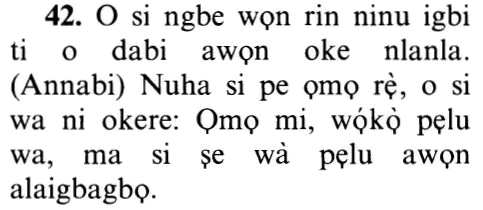11vs42
Select any filter and click on Go! to see results
وَهِيَ تَجْرِي بِهِمْ فِي مَوْجٍ كَالْجِبَالِ وَنَادَى نُوحٌ ابْنَهُ وَكَانَ فِي مَعْزِلٍ يَا بُنَيَّ ارْكَب مَّعَنَا وَلاَ تَكُن مَّعَ الْكَافِرِينَ
Wahiya tajree bihim fee mawjin kaaljibali wanada noohunu ibnahu wakana fee maAAzilin ya bunayya irkab maAAana wala takun maAAa alkafireena
Index Terms
Click to play
Yoruba Translation

Hausa Translation
Kuma ita tanã gudãna da su a cikin tãguwar ruwa kamai duwãtsu, sai Nũhu ya kirãyi ɗansa alhãli, kuwa ya kasance can wuri mai nĩsa. "Yã ƙaramin ɗãnã! zo ka hau tãre da mu, kuma kada ka kasance tãre da kãfirai!"
Asbabu n-Nuzuul (Occasions of Revelation)
Concerning Allah's statement,
وَهِيَ تَجْرِي بِهِمْ فِي مَوْجٍ كَالْجِبَالِ ...
So it sailed with them amidst waves like mountains,
This means that the ship sailed with them upon the surface of the water, which had completely covered the earth until it encompassed the tops of the mountains and even rose over them by a height of fifteen cubits.
It was also said that the waves rose over the mountains by a height of eighty miles. Yet, this ship continued to move upon the water, sailing by the permission of Allah. It moved under His shade, His help, His protection and His blessing.
This is as Allah, the Exalted, said,
إِنَّا لَمَّا طَغَا الْمَآءُ حَمَلْنَـكُمْ فِى الْجَارِيَةِ
لِنَجْعَلَهَا لَكُمْ تَذْكِرَةً وَتَعِيَهَآ أُذُنٌ وَعِيَةٌ
Verily, when the water rose beyond its limits, We carried you in the ship. That We might make it an admonition for you and it might be retained by the retaining ears. (69:11-12)
Allah also said,
وَحَمَلْنَاهُ عَلَى ذَاتِ أَلْوَحٍ وَدُسُرٍ
تَجْرِى بِأَعْيُنِنَا جَزَآءً لِّمَن كَانَ كُفِرَ
وَلَقَدْ تَّرَكْنَـهَا ءايَةً فَهَلْ مِن مُّدَّكِرٍ
And We carried him on a (ship) made of planks and nails, floating under Our Eyes: a reward for him who had been rejected! And indeed, We have left this as a sign. Then is there any that will remember (or receive admonition)! (54:13-15)
The Story of the drowning of Nuh's Disbelieving Son
Allah continues the story, saying,
... وَنَادَى نُوحٌ ابْنَهُ ...
and Nuh called out to his son,
This was the fourth son of Nuh. His name was Yam and he was a disbeliever. His father, Nuh, called him at the time of boarding the ship, that he might believe and embark with them. If he did so, he would be saved from drowning like the other disbelievers.
... وَكَانَ فِي مَعْزِلٍ يَا بُنَيَّ ارْكَب مَّعَنَا وَلاَ تَكُن مَّعَ الْكَافِرِينَ ﴿٤٢﴾
who had separated himself (apart): "O my son! Embark with us and be not with the disbelievers.''
وقوله " وهي تجري بهم في موج كالجبال" أي السفينة سائرة بهم على وجه الماء الذي قد طبق جميع الأرض حتى طفت على رءوس الجبال وارتفع عليها بخمسة عشر ذراعا وقيل بثمانين ميلا وهذه السفينة جارية على وجه الماء سائرة بإذن الله وتحت كنفه وعنايته وحراسته وامتنانه كما قال تعالى" إنا لما طغى الماء حملناكم في الجارية لنجعلها لكم تذكرة وتعيها أذن واعية " وقال تعالى " وحملناه على ذات ألواح ودسر تجري بأعيننا جزاء لمن كان كفر ولقد تركناها آية فهل من مدكر " وقوله" ونادى نوح ابنه " الآية هذا هو الابن الرابع واسمه يام وكان كافرا دعاه أبوه عند ركوب السفينة أن يؤمن ويركب معهم ولا يغرق مثل ما يغرق الكافرون.
"وهي تجري بهم في موج كالجبال" في الارتفاع والعظم "ونادى نوح ابنه" كنعان "وكان في معزل" عن السفينة
الموج جمع موجة ; وهي ما ارتفع من جملة الماء الكثير عند اشتداد الريح . والكاف للتشبيه , وهي في موضع خفض نعت للموج . وجاء في التفسير أن الماء جاوز كل شيء بخمسة عشر ذراعا .
I'raab - grammatical analysis of the Qur'an
«وَهِيَ» الواو واو الحال وهي مبتدأ.
«تَجْرِي» مضارع فاعله مستتر والجملة خبر.
«بِهِمْ» متعلقان بتجري.
«فِي مَوْجٍ» متعلقان بتجري.
«كَالْجِبالِ» متعلقان بمحذوف صفة لموج.
«وَنادى » ماض.
«نُوحٌ» فاعل.
«ابْنَهُ» مفعول به والهاء مضاف إليه.
«وَكانَ» الواو حالية وكان اسمها محذوف.
«فِي مَعْزِلٍ» متعلقان بمحذوف خبر والجملة حالية.
«يا» أداة نداء.
«بُنَيَّ» منادى وحذفت ياء المتكلم للتخفيف والجملة مقول القول.
«ارْكَبْ» أمر فاعله مستتر.
«مَعَنا» ظرف مكان متعلق باركب ونا مضاف إليه.
«وَلا» الواو عاطفة ولا ناهية.
«تَكُنْ» مضارع ناقص مجزوم واسمها محذوف.
«مَعَ» ظرف مكان متعلق بالخبر المحذوف.
«الْكافِرِينَ» مضاف إليه مجرور بالياء لأنه جمع مذكر سالم والجملة معطوفة.
